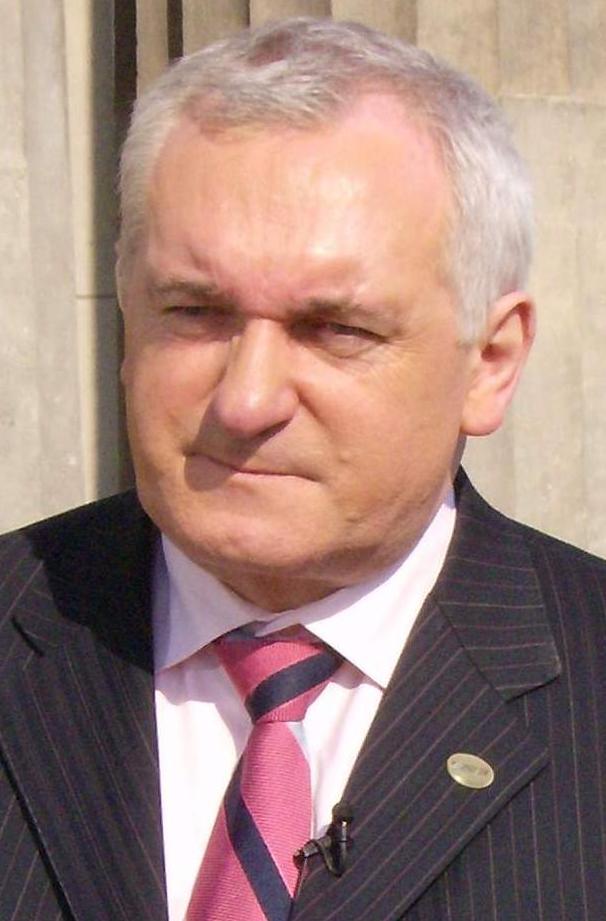
Mahon Tribunal
The Tribunal of Inquiry into Certain Planning Matters and Payments,[1] commonly known as the Mahon Tribunal after the name of its last chairman, was a public inquiry in Ireland established by Dáil Éireann in 1997 to investigate allegations of corrupt payments to politicians regarding political decisions.[2] It mostly investigated planning permissions and land rezoning issues in the 1990s in the Dublin County Council area. Judge Alan Mahon was the final chair of the tribunal and its other members were Judge Mary Faherty and Judge Gerald Keys. The original chairman, who was the sole member until just before his retirement, was Judge Feargus Flood, giving rise to the original common name of the Flood Tribunal.[3]
Date
4 November 1997 – 22 March 2012
Tribunal of Inquiry into Certain Planning Matters and Payments
Flood Tribunal
- Judge Alan Mahon
- Judge Feargus Flood
- Judge Mary Faherty
- Judge Gerald Keys
Using investigations to collect evidence and public hearings with witnesses, it investigated allegations made in the media prior to its establishment and allegations subsequently made to the tribunal itself. The tribunal ran from November 1997 to March 2012 and was the longest running and most expensive public inquiry held in the Republic of Ireland,[4] with costs forecast to reach between €250 million and €300 million.[2] Public hearings concluded in September 2008, and following several delays due to legal challenges, the tribunal began preparing its final report.[5] It published four interim reports, and the final report was published on 22 March 2012.[6] On 2 April 2008, then-Taoiseach Bertie Ahern resigned due to continuing controversy over the payments.
Background[edit]
Loughlinstown[edit]
Loughlinstown was, prior to 1990 a scenic area directly south of Dublin city on the Wexford road, site of the first dual carriageway in Ireland. In 1991, an intensive IR£800,000 public relations (PR) campaign to generate local support for the rezoning of hundreds of acres in Loughlinstown and nearby Cabinteely was spearheaded by public relations consultant and sports broadcaster Bill O'Herlihy and later by PR consultant and former political secretary Frank Dunlop. Some councillors firmly resisted the rezoning, supposedly concerned about the commercial and social welfare of nearby Dún Laoghaire but are alleged to have ensured that there was sufficient support from colleagues whose political bases were elsewhere. The rezoning was approved.
Fianna Fáil politician Liam Lawlor was presented at a public meeting concerning nearby Cherrywood as his party's "planning expert".
£10,000 reward[edit]
There had long been speculation about the extent of corruption underlying these planning decisions, and there had been several Gardaí inquiries in the 1980s and 1990s but these failed to uncover evidence.
Michael Smith, later to become chairman of environmental body An Taisce and barrister Colm Mac Eochaidh, later a Fine Gael candidate in Dublin South-East in the 2002 general election now a High Court Judge, in 1995 co-sponsored a £10,000 reward[7] for information leading to convictions for planning corruption.
James Gogarty, a retired employee of construction firm JSME, responded with information about payments to Ray Burke, a government minister and former Chairman of Dublin County Council.
Establishment[edit]
During the formation of the new Ahern Government in June 1997, questions about the suitability of the appointment of Burke as a minister were raised. Ahern asked Dermot Ahern to investigate, and defended Burke, saying "I've looked up every tree in North Dublin". Burke was appointed to the Government but resigned in September following further public revelations and questions. This increased pressure on the Government to investigate. The tribunal was formally established on 4 November 1997 to investigate the Gogarty allegations, and also any acts related to planning processes which might have involved corruption.
The terms dictated that the Tribunal would enquire into payments to Ray Burke in the course of his long political career and examine the decisions he had made in broadcasting as well as in planning.
The government had just months earlier also established the separate Moriarty Tribunal to investigate payments to politicians Charles Haughey and Michael Lowry.
The Tribunal has organised its investigations into discrete modules:[8]
Outcomes[edit]
Corruption findings against councillors[edit]
Findings of corruption were made against 11 councillors, due to court proceedings only 6 were named Fianna Fáil's Pat Dunne (Deceased), Finbarr Hanrahan, Cyril Gallagher and G. V. Wright, Fine Gael's Tom Hand, Labour's John O'Halloran.[16]
Prison sentences[edit]
George Redmond and Ray Burke have served prison sentences for tax evasion. Liam Lawlor has served three prison sentences for non-co-operation.
Tax yields[edit]
The Tribunal had cost the State €21 million by 2002 but €34.5 million was recovered by the Revenue Commissioners and the Criminal Assets Bureau.
The Bailey brothers and their company, Bovale Developments reached a settlement with the Revenue Commissioners in respect of PAYE, PRSI, Corporation Tax and Income Tax in 2006.
Jackson Way assets[edit]
The Criminal Assets Bureau successfully obtained a High Court order on 26 July 2006 freezing land assets of 107 acres (0.43 km2) at Carrickmines, County Dublin owned by Jackson Way Properties Ltd and preventing their sale.[17] CAB contended that these lands had been rezoned by a 13–11 vote on 16 December 1997 by Dún Laoghaire–Rathdown County Council from agricultural to industrial after Frank Dunlop bribed and made corrupt payments to councillors to secure their support in the rezoning vote. That vote, for example, increased the value of just 17 acres (69,000 m2) of the property from €8 million to €61 million. CAB interviewed and took statements from Frank Dunlop with the intention of using him as a witness against a number of property developers.
The lands in question were the subject of investigation by the Tribunal in 2003 and 2004.
Reports and findings[edit]
The inquiry published four interim reports, confirming corruption in the planning process, before its final report.